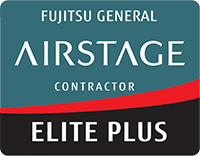Energy efficient heat pumps keep your home warm in the winter and cool in the summer, while reducing your energy use and impact on the environment. At McMahon Plumbing & Heating, we install the leading brands of heat pumps, both ducted and ductless systems.
One System, Year Round Comfort
Switch to a heat pump! Save energy, lower your bills, and enjoy all-season comfort. Free estimates.

Rebates Are Available
The Sponsors of Mass Save® offer incentives and rebates on heat pumps as well as an opportunity to apply for 0% financing. As a qualified Mass Save Heat Pump Installer, we can help make sure you get the rebates and financing you’re entitled to.

We sell and install leading brands of heat pumps, including Fujitsu, Mitsubishi, and Daikin.
We’ve earned Fujitsu’s Elite Plus distinction for our heat pump installations. For you, that means expert service, faster installations, and peace of mind backed by a trusted name in comfort.
Air Source Heat Pump Basics
Air source heat pumps supply your home with both heating and cooling. Like a refrigerator or air conditioner, heat pumps use electricity to move heat from a cool space to a warm space. In the winter, a heat pump will move heat from outside into your home, making your home warmer. In the summer, a heat pump moves heat from your house into the outdoors, acting as an air conditioning system.
GET IN TOUCHWhat Are the Benefits of a Heat Pump?
Installing a heat pump comes with several great benefits, including:
- Low-cost heating and cooling
- Zoned temperature control
- Remote-controlled operation
- Whisper-quiet sound and sleek design
- Increased home comfort and resale value
Ready to schedule your heat pump installation, or want to talk with one of our experts and get a free quote? Get in touch with McMahon today!

 BOOK SERVICE
BOOK SERVICE